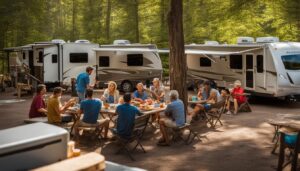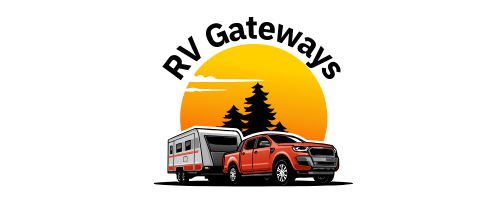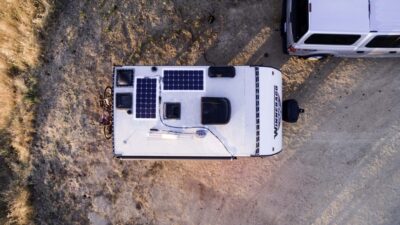When planning a road trip or camping adventure in an RV, one of the key considerations is staying connected. While the open road and nature offer a sense of freedom, many travelers still rely on internet access for work, entertainment, or staying in touch with loved ones. With the increasing use of technology, it’s only natural to wonder if you’ll be able to get online while at your RV park. Do RV parks have wifi? It’s a question that comes up often, especially as Wi-Fi becomes an essential part of modern life.
The availability of Wi-Fi at RV parks can vary widely depending on the location, amenities, and park management. Some parks offer free high-speed internet, while others might charge a fee or provide limited access. Whether you’re working remotely or just checking in on social media, it’s important to research your destination ahead of time to ensure you’ll have the connectivity you need.
Do RV Parks Provide Wi-Fi Connection ?
When it comes to RV parks, the availability of Wi-Fi is an important consideration for many travelers. As the world becomes increasingly connected, people expect internet access, even when they’re away from home, enjoying a camping or road trip experience. RV Parks do provide wifi connection but not all RV parks offer it, and the quality of service can vary significantly between locations.
Some higher-end or more modern RV parks tend to provide free Wi-Fi as part of their amenities. These parks often cater to guests who may need to work remotely or enjoy streaming services during their stay. The Wi-Fi in these parks is typically available throughout the campground or in specific areas like the clubhouse or near the office. However, even when Wi-Fi is offered, the connection may not always meet the speed and reliability standards that people are accustomed to at home.
On the other hand, many smaller or more rustic RV parks might not have Wi-Fi at all, especially in more remote areas. If they do offer internet, it might be limited or unreliable, with bandwidth restrictions that prevent multiple devices from connecting smoothly. In such cases, some parks might offer Wi-Fi in select areas like the office or common rooms, but it may not extend to the individual RV sites.
Another factor to consider is that some RV parks charge for Wi-Fi access. In these cases, the internet may be a premium service, with faster speeds and more stable connections available for an additional fee. The quality of Wi-Fi varies depending on the location and the technology used by the park, with more urban or high-demand areas generally offering better connectivity.
Before booking your stay at an RV park, it’s a good idea to check the amenities list or directly contact the park to inquire about Wi-Fi availability and reliability. That way, you can plan ahead and know whether to expect seamless internet access or if you’ll need to make other arrangements to stay connected.
Factors That Affect RV Park Wi-Fi 
When staying at an RV park, the quality of Wi-Fi service can vary due to several factors. Understanding these factors can help you better prepare for your trip, especially if internet access is important for work, entertainment, or staying connected. Here are some key elements that influence the availability and performance of Wi-Fi at RV parks:
- Location of the RV Park
The location of the RV park plays a significant role in Wi-Fi availability. Parks in remote, rural, or mountainous areas may struggle to provide strong internet signals due to limited infrastructure and a lack of nearby cell towers. In contrast, parks located in or near larger cities are more likely to have better Wi-Fi service thanks to access to stronger networks and modern equipment.
- Infrastructure and Equipment
The type of equipment used by the RV park for Wi-Fi connectivity is crucial. Parks that invest in high-quality routers, repeaters, and access points tend to offer better and more reliable Wi-Fi. Older or poorly maintained equipment can lead to slower speeds and unreliable connections, especially when there are many people using the internet at the same time.
- Bandwidth and Network Congestion
RV parks often share a single internet connection, which can be split between numerous campers. During peak hours, such as evenings or weekends, the network can become congested, leading to slower speeds and connectivity issues. If the park has limited bandwidth or too many users, the experience can be frustrating, especially for those needing a stable connection.
- Proximity to Wi-Fi Access Points
Some RV parks offer Wi-Fi only in specific areas, such as near the office or common areas, rather than at each individual RV site. If you’re parked far from the main access point, the signal might be weak or even non-existent. The closer you are to the access points, the stronger your connection is likely to be.
- Pricing and Service Plans
Some RV parks offer Wi-Fi for free, while others charge extra for access. In cases where the park charges for Wi-Fi, the service might be faster, more stable, and more widely available. Free Wi-Fi might be offered with limitations, such as lower speeds or restricted access to certain services like streaming or video calls.
- Weather Conditions
Weather can also impact Wi-Fi quality, especially if the internet signal relies on satellite or wireless connections. Heavy rain, storms, or other adverse weather conditions can interfere with the signal, leading to slower speeds or disconnections. The park’s infrastructure may also be more susceptible to weather-related disruptions in certain locations.
- Number of Devices
The number of devices connected to the network can affect performance. If many guests are streaming movies, working remotely, or browsing the web simultaneously, it can slow down the connection for everyone. Parks that don’t limit the number of devices per user or per site may experience more congestion and slower internet speeds as a result.
The Wi-Fi quality at RV parks can be influenced by various factors, from the location of the park to the technology used and the number of devices on the network. Understanding these elements can help set expectations for your stay and guide you in making decisions about whether to rely on the park’s internet or explore other options like mobile hotspots. To ensure you have a smooth experience, always check with the park in advance about the Wi-Fi situation, especially if you need reliable access for work or other essential tasks.
What to Expect From Wi-Fi in RV Parks
When staying at an RV park, the Wi-Fi experience can vary significantly depending on the park’s location, infrastructure, and policies. Understanding what to expect can help you prepare for your stay, especially if you rely on the internet for work, entertainment, or staying connected with friends and family. Below is what you might expect from Wi-Fi in RV parks:
- Availability of Wi-Fi
Most RV parks offer Wi-Fi, but its availability isn’t guaranteed, especially in more remote or rustic parks. In larger, more modern parks, Wi-Fi might be available throughout the campground, while in smaller or rural parks, it could be limited to certain areas like the office or community center. Always check ahead to make sure the park offers Wi-Fi and if it covers your RV site.
- Speed and Reliability
The speed and reliability of Wi-Fi in RV parks can vary widely. In some parks, you may have access to fast, high-quality internet that allows for smooth streaming, video calls, and working remotely. However, in other parks, the connection might be slower, especially during peak hours when many guests are using the network. During busy periods, such as weekends or holidays, you might experience slower speeds due to network congestion.
- Free vs. Paid Wi-Fi
Some RV parks provide free Wi-Fi as part of their amenities, while others charge extra for internet access. Free Wi-Fi may come with limitations, such as slower speeds or restricted access to certain services. In paid Wi-Fi situations, you might experience faster speeds and more stable connections, especially if the park has invested in premium infrastructure. It’s important to ask about the pricing structure, as some parks offer tiered pricing based on speed or usage.
- Signal Strength
The signal strength can vary depending on where your RV site is located. If you’re parked far from the main access point or near trees or buildings that block signals, you may experience weak or intermittent connectivity. Parks that use satellite or wireless connections may also face signal interruptions during inclement weather, affecting overall service quality.
- Network Congestion
In popular RV parks, especially those that cater to long-term guests or are located in tourist-heavy areas, you might find that network congestion becomes an issue during peak times. When many people connect to the Wi-Fi at once, the shared bandwidth can slow down, making it difficult to stream content or complete work tasks that require a stable connection. Some parks may limit the number of devices per site to help alleviate congestion.
- Limited Access
Some RV parks restrict access to certain websites or services, particularly if the Wi-Fi is free. Streaming services like Netflix, Hulu, or YouTube might be blocked or limited, especially if the park’s bandwidth is shared among many users. If you need to use certain services, it’s a good idea to ask the park about their policies beforehand.
- Support and Troubleshooting
Many RV parks have staff available to assist with Wi-Fi issues, but support might be limited. In larger parks, you may have access to a dedicated help desk or IT support, while in smaller parks, troubleshooting might be minimal. Be prepared for the possibility that issues may not be resolved immediately, especially if the park lacks advanced infrastructure.
Wi-Fi in RV parks can be a mixed experience, ranging from fast and reliable to slow and spotty. To ensure you have a smooth stay, it’s a good idea to research the park’s internet policies and read reviews from other guests about their experiences. Whether you rely on Wi-Fi for work, streaming, or keeping in touch, knowing what to expect can help you plan your trip and adjust your expectations accordingly.
How to Find RV Parks with Good Wi-Fi

Finding RV parks with reliable Wi-Fi can make a big difference, especially if you need internet access for work, staying connected, or entertainment. Below are practical tips and strategies to help you locate RV parks with good Wi-Fi:
- Research Online Reviews
- Use platforms like Campendium, RV LIFE Campground Reviews, or Google Reviews to check feedback from other campers. Look for mentions of Wi-Fi quality in the reviews—guests often share their experiences, highlighting whether the internet was fast, reliable, or limited.
- Pay attention to recent reviews, as Wi-Fi quality can change due to upgrades or increased usage.
- Check the RV Park’s Website
- Many RV parks list their amenities on their website, including details about Wi-Fi. Look for specifics like “Wi-Fi available at all sites” or “high-speed internet.”
- Some parks may also mention whether the Wi-Fi is free, fee-based, or restricted to specific areas, like the clubhouse or office.
- Call the RV Park Directly
- If the website lacks information, call the park to ask about their Wi-Fi setup. Questions to ask include:
- Is Wi-Fi available throughout the park or only in certain areas?
- What is the average speed and reliability of the connection?
- Are there any extra fees or device limits?
- Speaking directly to staff can give you a clearer picture of what to expect.
- Look for “Tech-Friendly” RV Parks
- Some RV parks brand themselves as tech-friendly or remote-worker-friendly, indicating they cater to guests who need reliable internet. Parks that advertise as “work-from-anywhere” destinations often have upgraded Wi-Fi infrastructure.
- Join RV Community Groups
- Engage with RVing communities on platforms like Facebook, Reddit, or RV forums. Experienced RVers often share recommendations for parks with excellent Wi-Fi. These communities can also provide advice on alternate solutions, like hotspots or signal boosters.
- Consider Larger or Newer RV Parks
- Larger parks or those built or renovated recently are more likely to invest in better Wi-Fi infrastructure. These parks often cater to modern travelers who expect reliable internet access.
- Use Wi-Fi-Focused Apps
- Apps like WiFi Map or OpenSignal can help you identify areas with strong Wi-Fi signals. While they primarily focus on public hotspots, they can give you an idea of connectivity in the area near an RV park.
- Avoid Remote or Wilderness Locations
- Parks located in rural or wilderness areas often struggle to provide reliable Wi-Fi due to infrastructure limitations. If high-speed internet is a priority, stick to parks closer to cities or towns with strong network coverage.
- Check for Paid Premium Options
- Some parks offer both free and premium Wi-Fi options. The paid service often provides faster speeds and better reliability. If having good internet is essential, it might be worth opting for the premium tier.
- Test the Wi-Fi Upon Arrival
- If possible, ask for a test of the Wi-Fi connection before committing to a longer stay. This is especially useful for extended trips or if you’re staying in the park for work-related purposes.
Finding RV parks with good Wi-Fi requires a bit of research and planning, but it’s worth the effort if internet access is a priority. By checking reviews, contacting parks directly, and utilizing RVing communities, you can identify locations that meet your connectivity needs. For added flexibility, consider alternative solutions like mobile hotspots or signal boosters in case park Wi-Fi doesn’t meet your expectations.
Alternatives to RV Park Wi-Fi

Staying connected while traveling in your RV doesn’t have to rely solely on the often unreliable Wi-Fi offered at RV parks. Whether you’re working remotely, streaming entertainment, or keeping in touch with family, there are several effective alternatives to RV park Wi-Fi. Here’s a breakdown of the most popular options:
- Mobile Hotspots
- What it is: A device or smartphone feature that uses cellular data to create a personal Wi-Fi network.
- Pros:
- Portable and easy to use wherever there’s cell service.
- Often provides faster and more secure internet than public or RV park Wi-Fi.
- Cons:
- Dependent on cellular coverage.
- Can be expensive if you exceed your data limits.
- Pro Tip: Look for unlimited hotspot data plans or RV-friendly packages from carriers like Verizon, AT&T, or T-Mobile.
- Satellite Internet
- What it is: A service that connects to the internet via a satellite dish, suitable for remote locations.
- Pros:
- Works in rural or off-grid areas where cellular signals are weak or unavailable.
- Provides consistent internet access, even far from cities.
- Cons:
- High initial equipment costs and monthly fees.
- Slower speeds and higher latency compared to other options.
- Weather-dependent performance.
- Popular Option: Consider Starlink for RVs, which offers reliable high-speed satellite internet tailored for mobile users.
- Wi-Fi Boosters and Extenders
- What it is: Devices that amplify weak Wi-Fi signals, extending the range and strength of existing networks.
- Pros:
- Affordable and easy to install.
- Ideal for improving park-provided Wi-Fi.
- Cons:
- Only effective if there’s an existing network to boost.
- Doesn’t solve issues with overloaded or slow park networks.
- Public Wi-Fi
- What it is: Free internet provided by businesses like coffee shops, libraries, restaurants, or truck stops.
- Pros:
- Free and widely available in urban or suburban areas.
- Cons:
- Requires leaving the RV park.
- Public networks are less secure; use a VPN to protect sensitive data.
- Pro Tip: Download maps or entertainment in advance when using public Wi-Fi to minimize reliance on it later.
- Cellular Data Plans
- What it is: Dedicated data plans designed for mobile internet access, often with hotspot capabilities.
- Pros:
- Reliable in areas with strong cell signals.
- Many plans cater specifically to travelers or RVers.
- Cons:
- Coverage can vary by carrier.
- Costs may add up if you require a lot of data.
- Preloaded Content for Offline Use
- What it is: Downloading movies, music, work documents, or other resources before arriving at a location with limited connectivity.
- Pros:
- No reliance on internet during your stay.
- Convenient for entertainment or productivity without interruptions.
- Cons:
- Requires planning ahead and enough storage space on devices.
- RV-Specific Internet Providers
- What it is: Internet services tailored for RV travelers, combining mobile hotspots and specialized routers.
- Pros:
- Designed to meet the needs of RVers.
- Offers flexibility for short-term or long-term connectivity.
- Cons:
- Can be more expensive than standard mobile plans.
- Example: Services like Nomad Internet or Mobile Must Have.
RV park Wi-Fi can be hit or miss, but with the right alternatives, you can stay connected wherever your travels take you. Options like mobile hotspots, satellite internet, and preloaded content ensure you’re prepared for a range of scenarios. By investing in the best solution for your needs, you can enjoy a seamless online experience, even on the road.
Conclusion
Many RV parks now offer Wi-Fi as a standard amenity, catering to the growing need for connectivity among travelers. While the quality and availability of Wi-Fi can vary, it is becoming increasingly common for parks to provide access either for free or for a small fee.
Do RV parks have Wi-Fi? Yes, but it’s always a good idea to check with the park beforehand, especially if reliable internet is essential for your stay. By doing so, you can plan accordingly and ensure a seamless experience during your travels.

